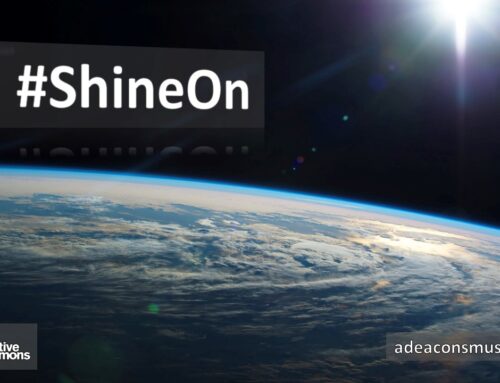First of all, though I sincerely wish that we were not called together to share in this time of grieving, good-bye saying and – hopefully – celebrating the life of my mother, Jeannette, please know how touched I am to know that you have travelled here from far and wide. She would be pleased to know that her life of nurturing communities across the country would bring us together on this day, which would have been her 71st birthday.
If, in the course of this time of eulogy, there is any one thing that I hope you take away it is the following: kindness, as an intentional commitment to hospitality, not only nurtures community, but changes the world. If my mother’s choices and life, as you as a lived testament represent, attests to any one thing it was that her life was grounded in welcoming people without guile or judgement. Rather, she met people where they were at and celebrated the vulnerability that comes in the strength of sharing stories.
I stand before you, with a broken heart, and well aware that there are many people who have nurtured the man I endeavour to be. In this journey, though there are many people for whom I give thanks, my time of youthful formation was nurtured by three people: my mother, my Sitto (one’s maternal grandmother in Arabic) and my Uncle Ernie.
When hearts break
shatter
as porcelain
upon granite
words fail
as tears fall
revealing soul’s tender mourning
then an offered hand heal
These three people, two of whom are no longer with us, taught me to honour those who have come before. They also taught me to not shy away from the truth or the awkward. As we share this time, therefore, for some of you the following will be new and for others it will not. My mother never hid her story, in fact her ability to share it is one of central ways in which she modelled how to create resilient communities, which often were composed of those whom she chose as family.
I have often used part of the following Penn-state Commencement Address, which was given Monday, May 16, 2011, by Denzel Washington. I have usually used it to begin conversations with faith communities that are at a place to begin to dream, vision and imagine. In the following excerpt, he is recognising the student context in which he was sharing his address and goes on to name the gifts they possess:
Some of you are business majors. Some of you are theologians, nurses, sociologists. Some of you have money. Some of you have patience. Some have kindness. Some have love. Some of you have the gift of long-suffering.
Some of these gifts my mom possessed, but the one that I think is most pertinent, and the one which has always captivated me when invited into places of congregational renewal is the gift of long-suffering.
My mother’s journey was not easy. I have, at more than one instance, begun to prepare this eulogy in the past. My mother was many things. She was a story-teller, poet, mother, friend, Sister, Auntie and – recently – was beginning to explore what it meant to be a Sitto.
My mother’s journey was not easy. She was tenacious, witty, sometimes somewhat obsessive, keenly political and radically generous. As Shelly and I walked with her for the last several years, after she chose to join us in Winnipeg following her retirement, it would not be uncommon, shortly – if not immediately – after we had purchased her groceries, perhaps stocked her with wine, that she would text or phone to let us know that she now found herself out of some staple or food, because she had just hosted someone as only she could do with great generosity.
My mother’s journey was not easy. Before there was a #MeToo movement, before there was an awareness of the silencing of women’s oppression and pain suffered behind closed doors, I would awaken during my teen years to the terrors, to the names, of men, often from or connected to my family of origin, who treated her in ways that one need only visit the Hebrew Scriptures to understand.
My mother’s journey was not easy. She endured surgeries gone wrong, diagnosis that led to pain. Mental wellness and illness were a constant balancing act and she engaged in this struggle with mirth, tears and reflection that led to healing, not cynicism.
Though my mother’s journey was not easy, I do not share these parts of her story to in any way imply that she was a victim. Though the cultural context in which we currently find ourselves too often dismisses the transformative work of self-knowing and acclaims victimhood, she was not a flattened story of suffering. In fact, if I understand Denzel Washington’s reference, my mother’s long-suffering was the place from which she drew fierce strength to live a life of hospitality.
I recently had the true gift to meet one of St. Andrew’s College’s international partners from Hanshin University in Seoul Korea. This last week, Professor Yeong Mee Lee offered the community two public lectures: Church as the Open Square of Hospitality and the Queer Community and Churches in Korea. I believe that my mom would have attended both, but I think the former would have certainly resonated.
Professor Lee challenged us to understand that a theology of hospitality, which is first modelled in the Hebrew Scriptures, is a mandate of welcome. This mandate is not about converting and changing the Other. In fact, this scriptural demand in grounded in the reality that by nurturing and welcoming, by living kindness and invitation, all are transformed. This change, from a Christian perspective, is ultimately about being love in a world that can be, as my mother would reflect, mean.
In 2008, after I had prepared my first eulogy for my mom, she tenaciously wrestled with her body to heal after a diagnosis that led to complications that should of led to her death. Not her – though – but not her.
During her long convalescence, she began to reflect on a pattern in her life, which was only amplified by that suffering in 2008: people confided in her – she would often joke that she seemed to be everyone’s Consigliere a la the Godfather. Not a wartime one, as she would wax, but one like Tom Hagen. She listened deeply and intentionally.
At first, as she lay in her hospitable bed, and then during visits and care provided by her Kingston family, people shared deeply with her. Sometimes joys, but often pains and hurts. She did not understand why. She was so grateful for the care offered, but she could not understand why people trusted her with their stories. It was then, that we began to discuss long-suffering.
My mother was not a victim – the suffering she endured opened her to a way of being that allowed her to be truly hospitable. In this living kindness, people knew they were not judged. She did not share her story to pontificate or complain. She did not self-divulge to invite pity or nurture anger against the people and circumstances that led to her own struggles.
In offering her story, in the smile that she had that lit up a room, she invited people into claiming the agency of their own story of healing. As my mother found new meaning with people who quickly became friends, often family, hospitality was the way she harnessed her suffering to change the world.
That she changed the world, I have no doubt. I know she did that for herself. In 2004, she began to integrate her life of hospitality with a journey into institutional faith. It took her that time to recognise that the church could be a place in which she could find language to understand the choices that she had made up until then. These choices led her to choose to be confirmed into the United Church of Canada, at Sydenham United Church, an Affirming Ministry, on March 28, 2004. Since then she not only journeyed toward her own healing, but invited others along with her.
That she changed the world, I have no doubt. I know that she made space and nurtured that for others. Many of you here reflect some of the faith communities she called home. In fact, in the short time she called Saskatoon home, she quickly found that St. Paul’s would become another one that she called home. Others, who are not here, have sent memories and care that clearly illustrate that her nurture of communities, grounded in hospitality. Across this country, my mother made communities that remember her smile, her welcome and the light she bore.
As our time comes to an end I want to share some of what I believe she would want to offer to some of those of us who are hurting in this time. I had the pleasure, for the last six years to have enjoyed food and fellowship with her and Shelly on a regular basis each Sunday or Monday night. Prior to that, we would talk every Sunday. This ritual, decades old, was sometimes just a few minutes and other times time could stretch. In this life-long ritual, I offer the following. Though I cannot claim to speak for her, I do believe that these words honour her care for you.
To her Brothers, she would invite you to reflect on this time in which you walk. As you take steps into the fall season, with winter upon the horizon, she would encourage you to be embraced and embrace your family. She knew that you all endured hurts from a family that privileged silence and favoured endurance over healing and the strength of vulnerability. She would want you to reconcile yourselves with one another and nurture your relationship with the children as the days shorten. Finally, she would pray you would find place to let go of those hurts and know you are loved, that she loved you.
To her daughter, with whom she was finally connected in 2012, she would offer that the choices she made was to allow you a life that she knew she could not have materially provided. She would share her sincere regret that those choices did not offer you the life for which she hoped. To her daughter and her family, she would celebrate that even in that regret, which she named but for which she did not judge herself, she has experienced a family that is a truly blessed example of the power of choices that nurture children to know they are loved.
To her Goddaughter and niece, Chanda, she was so very proud of you. Your choices to live justice was an inspiration. She would often reflect on her ability to critique public policy, which she learned from her mother. She celebrated that you not only think about it, but that you challenge it when it causes harm to the least. To Chanda and Mike, she would offer you care and love. Not ever with judgment, but with the care that as you navigate what love means, that you might find a balance that honours yourselves and Winnie and Jimmy.
To her nephew Derek, my dear cousin and Brother, she was so grateful for you. Your visits, whether when you travelled to see her, or more recently whether watching a Rider’s game or an episode of Columbo, she would share with me that time with you reminded her of the very best memoires she had growing up with her mother. Your warmth and welcome were a gift. She was very proud of you. For your commitment to the academy, she was honoured to be invited into the process of preparing your PhD. I believe more importantly, she joyfully recognised your intention to take that learning and translate it into the practicality of helping students learn not just about their discipline, but about themselves.
To my Dear One, for whom I could not be standing before you today, Shelly. On those Sundays, when you were not able to join us, she shared her deep gratitude for your love. She knew that too often mothers-in-law and daughters-in-law endure a relationship more akin to détente than one that is mutual. To you she gave thanks. There is one thing I do not believe she ever named to you. In your ministry, in your ability to walk with others in joy and greif, she was able to recognise in her own story a mother who loved her. This was not easy work for her, but your care for her, was one of the significant ways in which she healed with Sitto.
Finally, to each of you – those who have just met her for the first time or more recently. Those who called her friend or family, Kin, Sister or Brother, she would want me to end the way I began. She would know that perhaps I have spoken too much, perhaps not as clearly or articulately as I may want, so she would offer you the following:
Be kindness. Live a life of hospitality with intention. Go out into this world, in which fear and cynicism seem to be festering, and be a light of welcome. She would tell you that your smile, your baking, a shared cup of tea, Lays chips paired with Coke Zero, glass of wine or time spent with those who are hurting, can change the world. In her long-suffering, she would leave us with a smile – one that was guileless and non-judgemental. One that was mischievous, playful and inviting. And as that smile now so fades, may we choose to bear kindness as she would hope we might.
May her memory be eternal – thanks be to God.








Richard – what a wonderful tribute to your mom. love, Mo
Thanks for your kindness Mo!
Your Mother was one incredible woman who gave the world what it needed and required love form the heart and soul. She seemed to be the one that anyone could turn to in any dire straits os just an ear to listen to them. God is proud to call her home and have her with His Son Jesus Christ and the rest of everyone in heaven !! Thanks for sharing this warm kind thoughtful loving woman with us Richard !!
As is often the case, James, your care, engagement and kindness are gifts: thanks you.
You are welcome Richard. I provide the care, engagement and kindness as we are good friends. This comes with the territory.
Thank you Richard. A treasured relationship that you will carry with you always. And she was right about Lay’s potato chips and Come, great combination. Be gentle with yourself in this tender time my friend. Peace Marilyn
Thank you my dear Sister. As for the chips … yes indeed 🙂
Thank you for this. It moved me deeply.
Thank you Jason – I am most grateful for your sharing this!
Dear Richard,
Such a beautiful honoring of your mother and the loved ones who shared in her life, and who will keep her ever present in their memories and conversations.
Thank you Robyn. Knowing her story is well-received feels like a real gift.
Thank you for your words and reflections offered as the eulogy for your mother.The memories you have of your mother are so rich and I pray they will help carry you and your family forward. And may God’s comforting arms and Healing Spirit be with you. Blessings.
Thank you for sharing your care Michelle – I am most grateful.